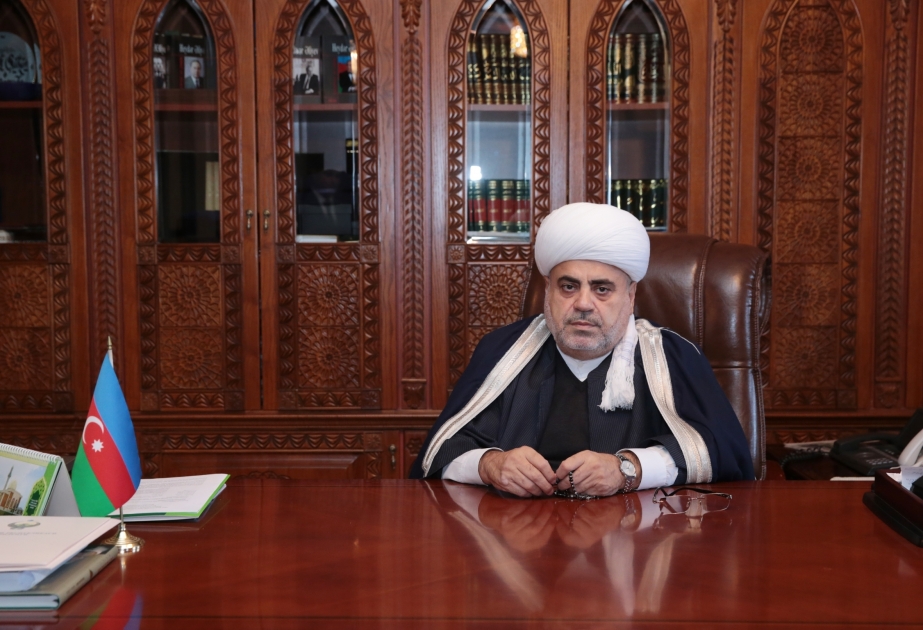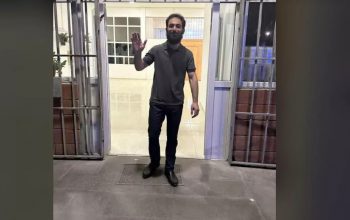Azerbaijan’s top Shi’a cleric, Sheikh-ul-Islam Allahshukur Pashazade, resumed his attacks on the Armenian Apostolic Church on Wednesday, accusing it of inciting ethnic hatred—just as Prime Minister Nikol Pashinyan continued his unprecedented campaign to discredit the Church’s leadership and demand the resignation of Catholicos Garegin II.
In a letter addressed to the World Council of Churches, Pashazade warned the international body not to support what he described as the Armenian Church’s “provocative, revanchist propaganda.” His remarks came in response to a recent international conference in Switzerland organized by the WCC that focused on preserving Nagorno-Karabakh’s Armenian Christian heritage in the wake of Azerbaijan’s 2023 military assault and occupation.
“The Armenian Church is calling on Armenians to fight to the death,” Pashazade claimed in the letter, repeating rhetoric commonly used by Azerbaijani President Ilham Aliyev to justify Baku’s continued threats toward Armenia and Artsakh’s cultural legacy.
Catholicos Garegin II had addressed that same conference in Bern, accusing Azerbaijan of conducting ethnic cleansing in Artsakh and launching “sham trials” against the region’s former leaders, now held as political prisoners in Baku. He also denounced Azerbaijan’s creeping incursions into Armenia’s sovereign territory.
The Catholicos’s remarks earned praise from much of Armenian society, but triggered what many see as a coordinated backlash—from both abroad and at home. Just days after Garegin’s speech, Pashinyan launched a series of daily personal attacks against the Church’s hierarchy on social media, accusing senior clergymen of violating celibacy vows and calling for Garegin’s resignation. He has since proposed forming a state-controlled body to remove and replace the head of the Church—a move widely condemned as illegal and authoritarian.
Opposition figures and public intellectuals have warned that Pashinyan’s smear campaign is an attempt to weaken one of the few remaining independent institutions in Armenia—one that has consistently criticized his government’s concessions to Azerbaijan.
Critics say the timing of Pashinyan’s offensive, alongside Pashazade’s renewed anti-Armenian rhetoric, is no coincidence. “It’s clear Pashinyan’s attacks on the Church are part of a broader agenda to appease Baku and remove internal obstacles to his policy of unilateral surrender,” said one prominent opposition MP. “He won’t criticize Aliyev, but he’ll call our Catholicos a criminal.”
Pashazade’s latest statement follows a similar May tirade, in which he announced the establishment of a new Azerbaijani Islamic office covering Armenia’s territory—justified, he claimed, by the idea that most of modern-day Armenia is “historical Azerbaijani land.” He also declared the Armenian Church a “threat to the region,” echoing irredentist rhetoric from Aliyev’s inner circle.
The Mother See of Holy Etchmiadzin rejected Pashazade’s claims as “absurd” and “ridiculous,” noting that the Azerbaijani cleric’s language only reinforces fears that Baku’s ambitions go far beyond Artsakh.
“These expressions of hatred and falsification, regularly voiced by Azerbaijan’s religious leaders, are evidence of the very threat that Azerbaijan poses to its neighbors,” the Church said in a May 23 statement.
Yet just days later, Pashinyan intensified his own assault. His accusations against Church leaders continued even after Garegin’s return to Armenia on Wednesday morning, when hundreds gathered at Zvartnots Airport to welcome him home.
Addressing the crowd, the Catholicos struck a calm and defiant tone. “With prudence and without agitation, the Church and our faithful will overcome this difficult period,” he said.
But the showdown is far from over. As the state encroaches upon religious autonomy under the pretext of reform, and Azerbaijani voices grow louder in decrying Armenia’s national church, many observers see a dangerous convergence of interests: a domestic leader seeking to eliminate dissent and a foreign adversary seeking to erase Armenian identity. In this context, Pashinyan’s campaign looks less like reform—and more like surrender.




